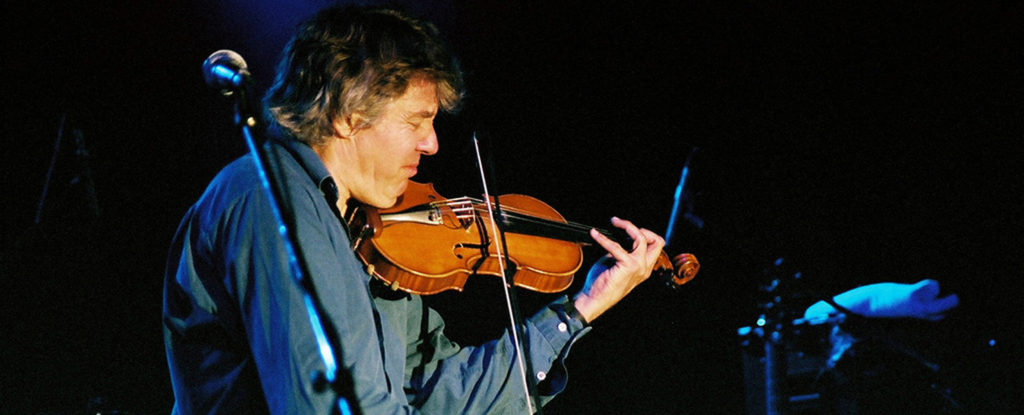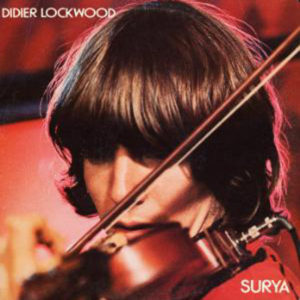Fusion Violinist Didier Lockwood Bows the Final String.
by John Diliberto 2/29/2018
Didier Lockwood (February 11, 1956 –February 18, 2018)
 Didier Lockwood was one of the violinists who took the instrument out of the worlds of classical music and gypsy/Hot Club jazz and brought it into the modern world with a string of fusion albums in the 1970s and 80s.
Didier Lockwood was one of the violinists who took the instrument out of the worlds of classical music and gypsy/Hot Club jazz and brought it into the modern world with a string of fusion albums in the 1970s and 80s.
Born in 1956. He was influenced by other French violinists, first Stephane Grappelli and then Jean-Luc Ponty who he first heard on the album, King Kong: Jean-Luc Ponty Plays the Music of Frank Zappa. A less well-known influence was the late-Polish violinist, Zbigniew Siefert.
Lockwood came to early renown with the French underground rock group, Magma and made his solo debut in 1979 with the album New World featuring Tony Williams on drums and pianist Gordon Beck. It was more of a mainstream jazz affair with covers of Coltrane’s “Giant Steps” and Sonny Rollins’ “Pentup” as well as several originals in that mode.
It was his second album, Surya that first brought him to my attention, a riveting fusion affair in the spirit of Ponty with ferocious drumming including double bass drum rolls, doubled synthesizer and violin melodies and scorching solos. The opening track, “Agartha”, written by keyboardist Luc Plouton, was a favorite on the Diaspar radio program on WXPN back then.
I got to meet Lockwood briefly in 1982 in Paris when keyboardist Francois Breant brought us to see him at a basement club. It was electrifying.
Lockwood went on to record many albums, including a Live in Montreux session with a band that included Bob Malach on saxophone, drummer Gerry Brown and keyboardist Jan Hammer. On 1985’s Out of the Blue he teamed up with the great jazz rhythm section of bassist Cecil McBee and drummer Billy Hart. He stretched out quite a bit into avant-garde terrain with the 1981 album, The String Summit-One World in Eight with several free jazz musicians including bassist Barre Phillips, cellist Abdul Wadud and drummers Fredy Studer and Pierre Favre.
 Lockwood was so highly regarded in Europe that he was gifted the Warlop violin. This is a tradition that began with violinist Michael Warlop, the orchestra leader of some of Stephane Grappelli’s first recordings. He gave one of his violins to Grappelli in 1937. Grappelli in turn, gifted it to Jean-Luc Ponty who, in 1979 gave it to Lockwood, indicating his preeminence. Lockwood would go on to record a few tribute albums to Grappelli.
Lockwood was so highly regarded in Europe that he was gifted the Warlop violin. This is a tradition that began with violinist Michael Warlop, the orchestra leader of some of Stephane Grappelli’s first recordings. He gave one of his violins to Grappelli in 1937. Grappelli in turn, gifted it to Jean-Luc Ponty who, in 1979 gave it to Lockwood, indicating his preeminence. Lockwood would go on to record a few tribute albums to Grappelli.
Lockwood had a sound that was influenced heavily by jazz saxophonists, especially John Coltrane. Later on you’d hear the impact of guitarists like John McLaughlin as well.
He was embraced by progressive rock musicians, appearing on Pierre Moerlen’s Gong’s Downwind album and two albums by Zao.
I lost the trail of Lockwood in the late 80s. His albums weren’t readily distributed or promoted in the US. He didn’t record much in this century, but made a comeback to recordings in 2017. His recent albums found in both pleasant, mainstreamish jazz terrain on Open Doors and total free-form electric explorations on Apesantar. He was recording and playing right up to the end.
Didier Lockwood turned 62 on February 11th, played his last concert at Bal Blomet in Paris on February 17 and left the planet on the following morning of Sunday, February 18 after suffering a heart attack.
